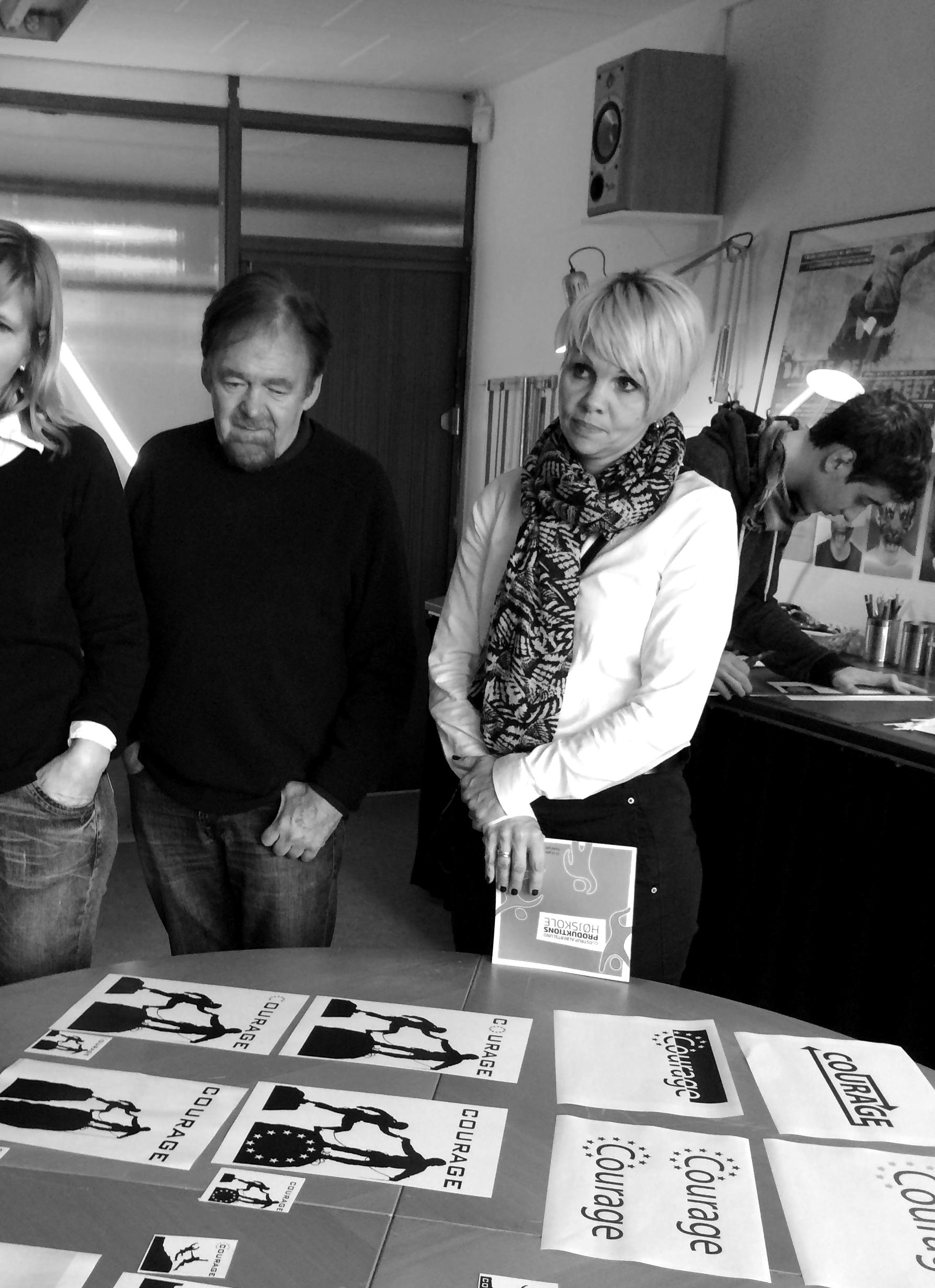
8 minute read
The Courage Project
by Theilgaard
Dr. Stephen Molloy (B.Sc.(Soc); Ph.D), Visiting Research Fellow, University of Leeds UK
The partnership is co-ordinated in Denmark and includes partners from Portugal. Ireland, Lithuania, and Norway. 2 partners are associated with autonomous municipalities in the Greater Copenhagen area. Albertslund Youth Centre offers full-time and part-time educational, professional and personal development for young people who have completed non-compulsory education but may not have realized their full potential or become clear about their future education and employment. Albertslund and Glostrup Production School provides informal education and practical workshop-based training for young people disengaged from more conventional schooling.
Advertisement
Alytus is a town of 60,000 people in South East Lithuania, not far from the borders with Poland, Belarus, and Kalingrad. Alytus Youth Centre supports the professional and personal development of over 1000 children, young people, and adults through a wide range of non-formal educational and recreational activities. These include ICT training, foreign language learning, music, dance, theatre and film production, handicrafts and sports.
In County Clare, Ireland, Clare Youth Service aims to assist the holistic development of young people and those who work with them. CYS trains and supports professional and voluntary youth workers and leaders to provide an integrated, individually-focussed service for young people, especially those in need of particular care and attention. Specific initiatives include: alcohol and drugs counselling; information provision; education, training and personal development; youth justice work; youth leadership and mentoring programmes; work-based training for the long-term unemployed; combatting social exclusion and rural isolation. Carlos Gargaté School Cluster is a complex of two schools located in Almada, a suburban municipality within Greater Lisbon, 20 kilometers south of the city itself. Escola Básica Carlos Gargaté is a Basic School for students aged between 6 to 15. It also has a vocational course related to civil protection. It has 80 teachers and about 700 students in 27 classes. Escola Básica Louro Artur (EBLA) has a kindergarten and primary school with about 370 students in 15 classes. Carlos Cargate has been working closely for several years with business and community initiatives, such as those associated with the Benfica Foundation, directed towards the educational and social re-engagement of disaffected young people through a range of leisure, recreational, and cultural activities.
Haugaland Upper Secondary School is located in the shipping and industrial port of Haugesund on the South West coast of Norway. It has approximately 800 students and 170 staff focusing on practical, vocational education. It offers a wide and successful range of innovative and “alternative” provision, including off-campus, work-based learning centres, for students disengaged from more conventional schooling. The School has 100 apprenticeship students, and is also responsible for prison education in Haugesund.
6| The COURAGE Project
Aims and Rationale
Current research across all European societies indicates a number of key features concerning the situation of young people disengaged or potentially disengaged from mainstream educational and employment opportunities. This is particularly important for younger people characterized as “NEETS” – (Not in Employment, Education or Training), and those at risk of becoming NEETs through Early School Leaving (ESL) and their more general disengagement from wider, socially inclusive networks.
Studies suggest that:
a) within the broad range of life-skills needed to exercise full citizenship, the development of social skills, self-confidence and positive self-esteem is very important for young people
b) sporting activities, non-formal types of education, and community activity such as drama, dance, music and multi-media workshops can be very effective in engaging or re-engaging young people in wider social and educational networks, raising self-confidence and self-esteem, developing social skills and team-working and thus combating social and economic exclusion
c) particularly effective initiatives have often been
“spear-headed” and supported by prestigious sporting and other organizations such as those our partners have worked with, e.g. those initiatives associated with leading football teams, such as the Benfica Foundation in Portugal.
In relation to these issues , the COURAGE partnership aims to explore and disseminate best practice in collaborations between educational organisations, youth services, and sports and other recreational associations working together to combat the social exclusion of young men and women. The immediate target groups for our findings and products are youth and community workers, school leaders and teachers, and trainers, coaches and leaders working with young people in a variety of related agencies. Community and voluntary agencies and workers have varying and often inadequate resources for training and support which can be optimized through these sorts of collaboration. The project’s ultimate beneficiaries are the many hundreds and thousands of young people whose life-chances we aim to enhance during and after the lifetime of the project by enhancing the knowledge and competence of our immediate target groups.
Preliminary needs analysis with these groups of youth workers, teachers and leaders shows a crucial need for more training and support directed specifically towards developing and sharing best practice for more effective inter-agency collaboration Currently, even those initiatives which seem most successful have often been developed on a largely ad hoc and “top-down” basis which has not encompassed a wide range of related practitioners and professionals from other agencies. Whether they are professionals or volunteers, these key practitioners typically have limited opportunities to share their experience and build upon within training situations to produce more effective, collaborative interventions.
We aim to help meet these needs by bringing together partners with considerable but differing types and levels of inter-agency working to combat youth disengagement. We identify and explore best practice in our different national and socio-economic contexts in order to develop and disseminate a range of innovative training and support materials and resources to meet the needs of our target groups.
Specifically, we aim to produce detailed analysis and reports and filmed presenations of “best practice” in 5 partner countries. These are major products in their own right but also form the basis of the resource packs we are for producing for the training and support of our target groups. These include a self-financing training course and associated COURAGE handbook, both of which are adaptable for distance or residential learning in all European countries, and sustainable by practitioners after the project’s lifetime. All of our findings, conclusions, analyses, reports, films and resource packs are being disseminated through a freely accessible public website (www. eucourage.eu) which is also sustainable after the
The COURAGE Project | 7
project’s lifetime; through publications and presentations in the academic and professional literature; and through a European conference for practitioners at the end of the project.
We believe that the most effective exploration and dissemination of “What works, where, and why”, in order to produce a core of best practice transferable to all European countries, must be based upon transnational analysis of practitioners’ experience of similar problems and strategies in a variety of different European settings. Each of our partners is engaged in local, regional and national networks of related agencies in education, youth and community work, sport and leisure. Their staff in general, and those who are working directly on the COURAGE project, are drawn from both educational and youth work backgrounds. They all have specific and varied experience of working with different types of disadvantaged learners from marginalized communities in different European countries and contexts, many of which have significant migrant or itinerant populations.
The Partnership At Work
The project’s work is divided into roughly equal “work packages” related to its major products and outcomes. These are: initial “state of the art” reports; case-study analysis and reports on best practice ; case-study films; learning, teaching and training activities; and dissemination activities. Each partner accepts responsibility for the oversight of one “work package” and for their own contributions to that and the other work packages.
Each partner sends 2 or 3 delegates to a formal meeting of the Project Management Board 5 or 6 times during the lifetime of the project. Progress since the last meeting is reviewed, and agreement is reached on what needs to be done before the next meeting. The first meeting was hosted in Albertslund and Copenhagen by the project co-ordinators in November 2015. The second, third, and fourth meetings were hosted by our Irish, Portuguese, and Norwegian partners respectively in Lisbon (April 2016), Ennis (October 2016), and Haugesund (April 2017). Each board meeting is the core of a wider symposium. Delegates visit educational and cultural institutions in each region, make and hear presentations, and discuss the project’s work and their own experience in relation to that of their hosts. Summaries of meetings and presentations are available on the COURAGE website.
Two types of LTT activity (Learning, Training, and Teaching) are also delivered by the project’s teams. Usually in parallel with a board meeting, three of the partners organize and runs a training programme of up to five days for members of their own staff and for delegates from each of the partner institutions who are not themselves board members. These courses allow wider circles of participants within each partner institution to share and enhance their experience of COURAGE work in different European social and educational contexts. LTT programmes are summarized in the COURAGE website.
The second type of LTT activity relates to the COURAGE training course referred to above. Project funding covers the partners’ preparation and production of the course and its hand book. The course is self-financing from delegates’ fees paid by their EU national agencies. One course was scheduled to run in Portugal in September 2017 and one in Ireland in April 2018. These operate as pilots for the final course and handbook to be produced by the end of the project. Their viability is dependent upon a minimum course attendance of about 20 delegates and hence upon the availability of national agency funding. Programmes and other details on the COURAGE website.
The second pilot delivery of the COURAGE training course will be integrated with the delivery of an international conference open to delegates from all European countries. The first two days of the training course will constitute a self-contained conference for those who choose to attend this event only. Delegates to the 5 day training course will draw upon this input for their subsequently more intensive sharing and discussions of their own and the project’s work with other delegates and with the project partners. Programmes for the course and conference are available on the COURAGE website
8| The COURAGE Project

The COURAGE Project | 9










